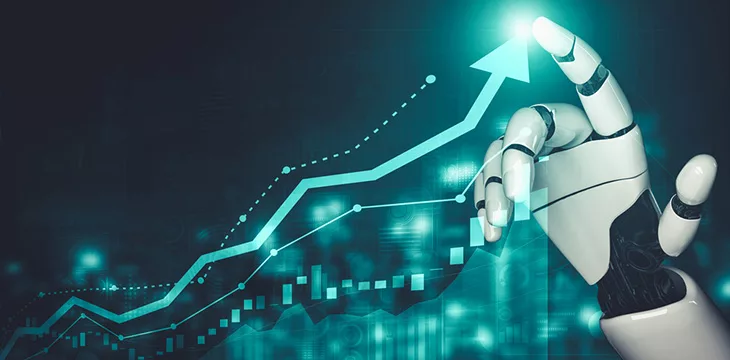
|
Getting your Trinity Audio player ready... |
Generative artificial intelligence (AI) will automate over half of all work done today by 2045, according to a new study by McKinsey, noting that the technology would add over $4.4 trillion to the global economy annually.
Generative AI produces various types of content, from text to imagery and audio output, in response to prompts. OpenAI’s ChatGPT has popularized the technology, making it one of the fastest-growing industries globally.
According to McKinsey, the AI era is just beginning.
What’s the value and impact of #generativeAI? Companies across countless industries are already experimenting with its applications. Our new research has found that the value at stake is huge–potentially $2.6 to $4.4 trillion in #productivity annually➡ https://t.co/pY5ACuvoL1 pic.twitter.com/ecZ0RvtzHl
— McKinsey & Company (@McKinsey) June 14, 2023
In its report, the management consulting giant estimated that generative AI would add between $2.6 trillion to $4.4 trillion annually. These numbers could double if the technology is embedded into software used for other tasks beyond the studied use cases, it added.
The technology will impact all industries, but banking and life sciences will see the most disruption. By integrating the technology, banking alone could record $340 billion in added value annually.
Generative AI will transform the workspace, with McKinsey estimating it will automate over half of today’s work by 2045. This prediction has been reduced by nearly a decade from the 2016 estimate by the rapid growth in usage and investment in the technology over the past few years.
AI has previously been touted to be more detrimental to low-level workers whose output can easily be automated. However, according to McKinsey, those in the higher ranks will face the most disruption. The company predicts that “knowledge work associated with occupations that have higher wages and educational requirements” will see the most impact.
McKinsey joins other global institutions that predict a big shift in work as we integrate generative AI. Goldman Sachs (NASDAQ: GS) predicted that over 300 million workers could lose their jobs to AI-powered automation, while the World Economic Forum (WEF) projected 83 million jobs would be lost to AI in the next five years. Already, AI was blamed for 4,000 job losses in the U.S. in May.
Some are still skeptical of the impact generative AI will have. David Autor, an economics professor at the Massachusetts Institute of Technology (MIT), says the technology is “not going to be as miraculous as people claim.”
Watch: Does AI know what it’s doing?
Recommended for you
Lorem ipsum odor amet, consectetuer adipiscing elit. Elit torquent maximus natoque viverra cursus maximus felis. Auctor commodo aliquet himenaeos fermentum
Lorem ipsum odor amet, consectetuer adipiscing elit. Accumsan mi at at semper libero pretium justo. Dictum parturient conubia turpis interdum

 11-21-2024
11-21-2024


